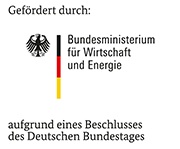16118 BG

Hochtemperaturofen in Betrieb
| Laufzeit: | 01.06.2009 - 30.07.2011 |
|---|---|
| Partner: | ZBT gGmbH, IFW (g)GmbH |
| Geldgeber: | Bundesministerium für Wirtschaft und Technologie über AiF |
| Bearbeiter: | Ammar Naji |
| Arbeitsgruppe: | Hochtemperaturwerkstoffe |
Fuel cell reformers are used to obtain hydrogen from steam and methane. The reformer to be investigated in the current project is part of a "fixed" fuel cell system in which reformer and fuel cell form one unit. One application opportunity is a heating device. The reformer operates at high temperatures in aggressive atmospheres, which may cause oxidation, carburisation and hydrogen embrittlement. Thus, materials and welds can be damaged.
The aim of this project is to find a perfect combination of design, welding technique, material selection and an appropriate coating for developing a fuel cell reformer. In order to find an economic material which is corrosion resistant, austenitic (17-19% Cr, 9-12% Ni) specimens were coated with several compounds using a pack cementation procedure. The samples were coated with aluminium and silicon. Furthermore, reactive elements (e.g. Y, Hf, Zr) were added to the pack compounds to investigate the reactive element effect on the austenitic material. Welded samples will also be coated. In order to simulate the conditions inside the reformer and to determine the most suitable combination of material and coating for our purpose, several coated and uncoated austenitic alloys and one uncoated Ni-based alloy specimen will undergo thermo cyclic testing. These tests are also done with welded specimens to investigate the behaviour of welding seams in corrosive atmospheres at high temperatures. The acoustic emission technique will be used to quantify the evolution of damage.
The knowledge gained about material, coating and welding concerning the reformer will be implemented in the final step. A reformer prototype will be developed and process guidelines dealing with reformer materials will be determined.
Beside the DFI, the ZBT gGmbH and the IFW (g)GmbH are involved in this project. The ZBT is responsible for design, whereas a suitable welding technique is being investigated at the IFW.

Das IGF-Vorhaben Nr. 16118 BG der Forschungsvereinigung DECHEMA e.V., Theodor-Heuss-Allee 25, 60486 Frankfurt am Main wurde über die AiF im Rahmen des Programms zur Förderung der industriellen Gemeinschaftsforschung (IGF) vom Bundesministerium für Wirtschaft und Energie aufgrund eines Beschlusses des Deutschen Bundestages gefördert.
PD Dr. Mathias Galetz
Tel.: 069 / 7564-397
E-Mail: mathias.galetz
Abschlussbericht (pdf, 13,2 MB)